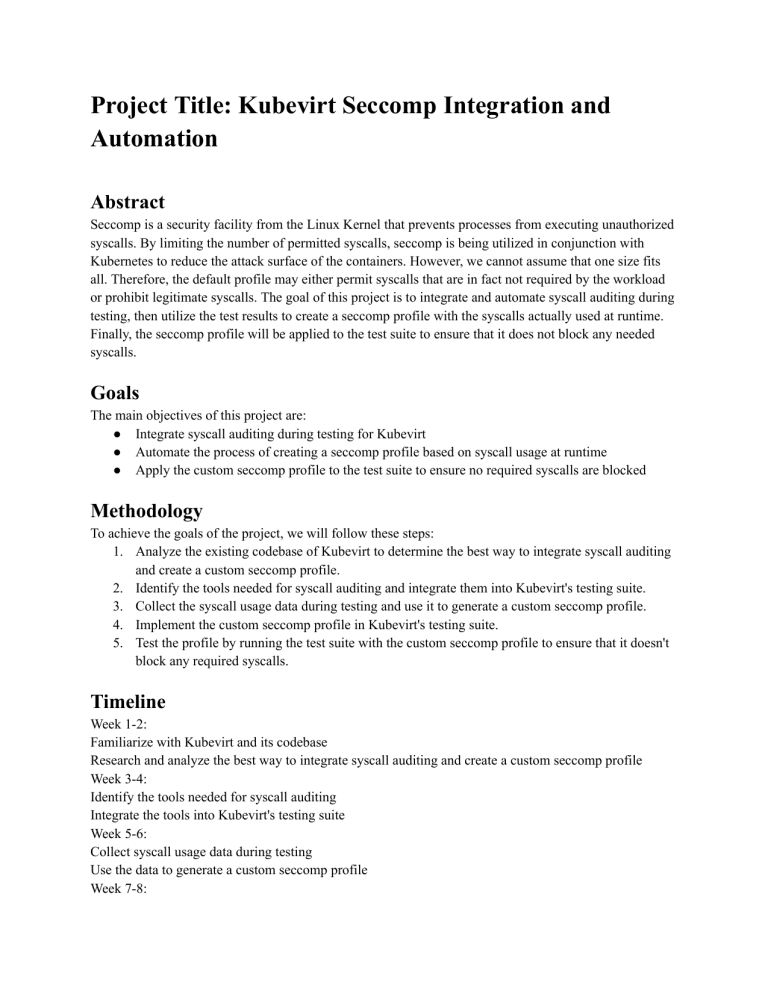
Project Title: Kubevirt Seccomp Integration and Automation Abstract Seccomp is a security facility from the Linux Kernel that prevents processes from executing unauthorized syscalls. By limiting the number of permitted syscalls, seccomp is being utilized in conjunction with Kubernetes to reduce the attack surface of the containers. However, we cannot assume that one size fits all. Therefore, the default profile may either permit syscalls that are in fact not required by the workload or prohibit legitimate syscalls. The goal of this project is to integrate and automate syscall auditing during testing, then utilize the test results to create a seccomp profile with the syscalls actually used at runtime. Finally, the seccomp profile will be applied to the test suite to ensure that it does not block any needed syscalls. Goals The main objectives of this project are: ● Integrate syscall auditing during testing for Kubevirt ● Automate the process of creating a seccomp profile based on syscall usage at runtime ● Apply the custom seccomp profile to the test suite to ensure no required syscalls are blocked Methodology To achieve the goals of the project, we will follow these steps: 1. Analyze the existing codebase of Kubevirt to determine the best way to integrate syscall auditing and create a custom seccomp profile. 2. Identify the tools needed for syscall auditing and integrate them into Kubevirt's testing suite. 3. Collect the syscall usage data during testing and use it to generate a custom seccomp profile. 4. Implement the custom seccomp profile in Kubevirt's testing suite. 5. Test the profile by running the test suite with the custom seccomp profile to ensure that it doesn't block any required syscalls. Timeline Week 1-2: Familiarize with Kubevirt and its codebase Research and analyze the best way to integrate syscall auditing and create a custom seccomp profile Week 3-4: Identify the tools needed for syscall auditing Integrate the tools into Kubevirt's testing suite Week 5-6: Collect syscall usage data during testing Use the data to generate a custom seccomp profile Week 7-8: Implement the custom seccomp profile in Kubevirt's testing suite Test the profile on a small scale Week 9-10: Test the profile on a larger scale and collect feedback Iterate on the profile based on feedback Week 11-12: Write documentation and prepare code for merge into Kubevirt Deliverables ● ● ● ● ● Integration of syscall auditing into Kubevirt's testing suite Automated creation of a custom seccomp profile based on syscall usage at runtime Implementation of the custom seccomp profile in Kubevirt's testing suite Successful testing of the custom seccomp profile on a small and large scale Documentation of the integration and usage of the custom seccomp profile Open Source Contribution The project's outcomes will be contributed to Kubevirt as open source code. This will enhance the security of the Kubevirt project and benefit the community that uses it. About Me My name is Yash Chaudhari, I am a computer science student at G.H Raisoni College of Engineering, Nagpur with experience in Linux kernel programming. I have little experience in open source contributions as well. I believe that this project is an excellent opportunity for me to combine my interests in open source and security to contribute to the Kubevirt community. Conclusion The integration of syscall auditing and creation of a custom seccomp profile will enhance the security of Kubevirt by reducing the attack surface of containers. This project will also provide valuable experience in system programming, security auditing, and open source contributions. I believe that I am a good fit for this project.

